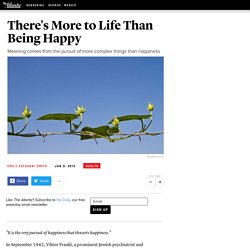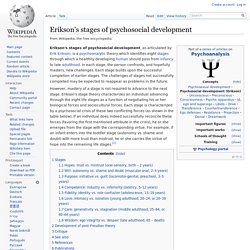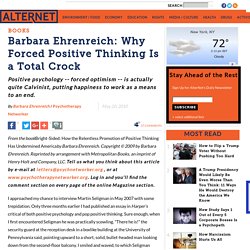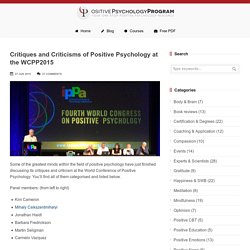

Plutchiknatureofemotions 2001. There's More to Life Than Being Happy. "It is the very pursuit of happiness that thwarts happiness.

" In September 1942, Viktor Frankl, a prominent Jewish psychiatrist and neurologist in Vienna, was arrested and transported to a Nazi concentration camp with his wife and parents. Three years later, when his camp was liberated, most of his family, including his pregnant wife, had perished -- but he, prisoner number 119104, had lived. In his bestselling 1946 book, Man's Search for Meaning, which he wrote in nine days about his experiences in the camps, Frankl concluded that the difference between those who had lived and those who had died came down to one thing: Meaning, an insight he came to early in life. When he was a high school student, one of his science teachers declared to the class, "Life is nothing more than a combustion process, a process of oxidation.
" Frankl jumped out of his chair and responded, "Sir, if this is so, then what can be the meaning of life? " Viktor Frankl [Herwig Prammer/Reuters] Peter Andrews/Reuters. Character Strengths, Character Building Experts: VIA Character. Erikson's stages of psychosocial development. Erikson's stages of psychosocial development, as articulated by Erik Erikson, is a psychoanalytic theory which identifies eight stages through which a healthily developing human should pass from infancy to late adulthood.

In each stage, the person confronts, and hopefully masters, new challenges. Each stage builds upon the successful completion of earlier stages. The challenges of stages not successfully completed may be expected to reappear as problems in the future. However, mastery of a stage is not required to advance to the next stage. Erikson's stage theory characterizes an individual advancing through the eight life stages as a function of negotiating his or her biological forces and sociocultural forces. Stages[edit] Hopes: trust vs. mistrust (oral-sensory, birth – 2 years)[edit] Existential Question: Can I Trust the World? The first stage of Erik Erikson's theory centers around the infant's basic needs being met by the parents and this interaction leading to trust or mistrust. Barbara Ehrenreich: Why Forced Positive Thinking Is a Total Crock. From the bookBright-Sided: How the Relentless Promotion of Positive Thinking Has Undermined Americaby Barbara Ehrenreich.

Copyright © 2009 by Barbara Ehrenreich. Reprinted by arrangement with Metropolitan Books, an imprint of Henry Holt and Company, LLC. Tell us what you think about this article by e-mail at letters@psychnetworker.org This e-mail address is being protected from spambots. You need JavaScript enabled to view it , or at www.psychotherapynetworker.org. Log in and you'll find the comment section on every page of the online Magazine section. I approached my chance to interview Martin Seligman in May 2007 with some trepidation.
He was not, however, waiting for me on the second floor and had disappeared into his office. Once we were at the museum—the one made famous by Rocky Balboa—the barriers to a normal interview seemed only to multiply. Loyalty, I recall, did not make it onto the list of virtues. H = f(S, C, V) Happiness and Health The Templeton Connection. 10. Critiques and Criticisms of Positive Psychology @ WCPP2015. Some of the greatest minds within the field of positive psychology have just finished discussing its critiques and criticism at the World Conference of Positive Psychology.

You’ll find all of them categorised and listed below. Panel members: (from left to right) Kim CameronMihaly CsikszentmihalyiJonathan HaidtBarbara FredricksonMartin SeligmanCarmelo Vazquez Research Issues: Research findings are often invalid, overstated, and misleading. Cultural/Values Issues: